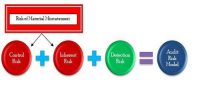There are significant differences in the methods, objectives, and parties responsible for the accounting process by which the financial statements are prepared and audit of the statements. An audit involves the evaluation of the accounting books of the company. An audit might be done through forensic accounting, or conducted by the company itself.
Accounting is the process of identifying, measuring, and communicating economic information to various users. It is keeping records of the financial transactions and preparing financial statements;
Auditing is a systematic process of objectively obtaining and evaluating evidence assertions about economic actions and events to ascertain of correspondence between those assertions and established criteria and communicating the results to interested users. It is a decisive assessment of the financial statements to give an estimation of their fairness.
A relationship between accounting and auditing –
- Methods:
Accounting methods involve identifying the events and transactions that affect the entity. Once identified, these items are measured, recorded, classified, and summarized in the accounting records. The result of this process is the preparation and distribution of financial statements that are in conformity with generally accepted accounting principles. The audit of financial statements involves obtaining and evaluating the evidence concerning management’s financial statements to enable the auditor to verify whether the statements do in fact present fairly the entity’s financial position, the result of operations and cash flows in conformity with GAAP.
- Objectives:
The ultimate objective of accounting is the communication of relevant and reliable financial data that will be useful for decision making. Rather than creating new information, the primary objective of auditing is to add credibility to the financial statements prepared by management. Accounting covers all transactions, records, and statements having financial implications; while auditing generally covers final financial statements and records.
- Responsibility:
Accounting is a creative process. An entity’s employees are involved in the accounting process, and ultimate responsibility for financial statement lies with the entity’s management. Accounting starts typically where book-keeping ends; while auditing always starts where accounting ends. Accounting is very comprehensive and captures all details associated with financial transactions, records and statements; whereas auditing usually uses financial statements and records on example basis.
- Timing:
Accounting is conceded out on a constant basis with a daily recording of financial transactions; while auditing is essentially a periodic procedure and conceded out after the preparation of final accounts and financial statements, generally on yearly basis. Accounting principally concentrates on the present financial transactions and activities; while auditing concentrates on the past financial statements.
The auditor is responsible for adhering to generally accepted auditing standards in gathering and evaluating the evidence and in issuing an audit report that contains the auditors’ conclusion expressed in the form of an opinion on the financial statements. If the company is traded on a stock exchange, the audit is typically done by an executive sovereign body. The audit procedure is an in-depth assessment of every financial transaction made by a company and encompasses the total year-end accounts. Upon the conclusion of the autonomous audit, the books and accounting measures are confirmed as perfect.
Those are the main relationship between auditing and accounting.















